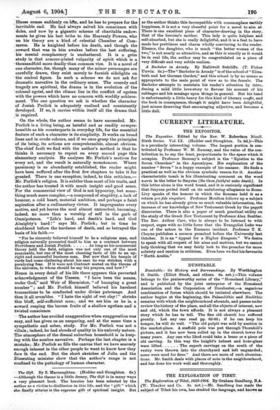The Expositor. Edited by the Rev. W. Robertson Nicoll. Sixth
Series. Vol. IX. (Hodder and Stoughton. 7s. 6d.)—This is a peculiarly interesting volume. The largest portion is con- tributed by Professor W. M. Ramsay, and the value of the con- tribution is, to say the least, proportionate to the space which it occupies. Professor Ramsay's subject is the "Epistles to the Seven Churches" in the Apocalypse. His explanation of the number " Seven" is a happy example of his manner. He finds a practical as well as the obvious symbolic reason for it. Another characteristic touch is his illuminating comment on the word warrds in the letter to Smyrna (Be thou faithful unto death). In this letter alone is the word found, and it is curiously significant that Smyrna prided itself on its unfaltering allegiance to Rome. Livy speaks of the honour in which the Romans held it as a retura pro fide singulari. Professor Moulton follows up a subject on which he has already given us much valuable information, the increase of our knowledge of New Testament Greek by the papyri discoveries. There is also a paper of much practical utility on the study of the Greek New Testament by Professor Alex. Souttar. The Rev. Arthur Carr, who is always to be listened to with respect, urges with no little force that the Evangelist Luke was one of the actors in the Emmaus incident. Professor T. K. Cheyne publishes a sermon preached before the University last October. It is an "Appeal for a Higher Exegesis." We desire to speak with all respect of his aims and motives, but we cannot help thinking that we may fairly look to the preacher for more sobriety and caution in criticism. Even here we find his favourite "North Arabia."






































 Previous page
Previous page